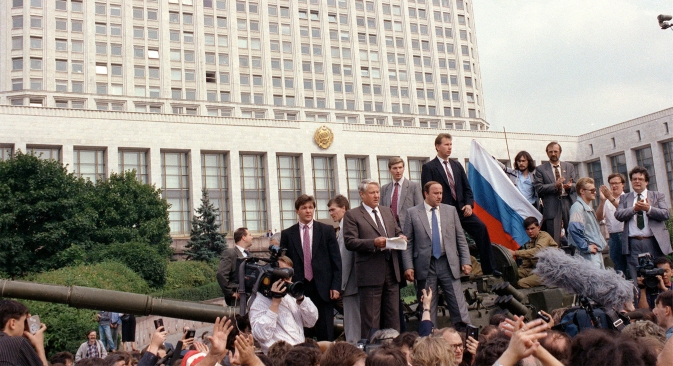
Russian President Boris Yeltsin (center) addresses a meeting as he stands on a tank outside the former Council of Ministers building on August 19, 1991. Source: Reuters
Exactly 25 years ago, on August 19, 1991, the Soviet Union’s State Committee on the State of Emergency (SCSE) cautioned citizens of the country with a series of anxious words:
“Compatriots! Citizens of the Soviet Union! In this difficult and critical hour for the fate of our fatherland and our peoples we turn to you! Deadly danger awaits our great homeland! The policy of reforms that Mikhail Gorbachev initiated as a means of guaranteeing dynamic development of our country and the democratization of society has, for a series of reasons, reached a dead end. Taking advantage of the liberties given them, trampling on the fresh buds of democracy, extremist forces have appeared and intend to liquidate the Soviet Union, destroy the government and seize power at any cost."
It was the first time the people had heard of the SCSE.
Three days of confrontation
The committee, which had been formed just a day earlier, included representatives of the Soviet top brass: the Vice-President, the Prime Minister and the head of the KGB. Vice President Gennady Yanaev, issued a decree appointing himself head of the government, citing Mikhail Gorbachev's poor health. Gorbachev himself, who was preparing a new constitution project that would have turned the USSR into a loose confederation, was detained by coup participants in Crimea, where he was on holiday.
The SCSE introduced censorship and restricted TV broadcasting. The TV stations, having changed their broadcast programmes, constantly showed footage of the ballet ‘Swan Lake’, which many people still associate with those events.
The committee lasted for only three days. The "putschists," as SCSE members were called by allies of the popular Russian leader Boris Yeltsin, could not overpower the centre of opposition to the SCSE, which in those days was the White House in Moscow, where the Russian government was located. The committee members decided not to storm the building. By that time Yeltsin's entourage was able to bring Gorbachev back from Crimea. After that, all SCSE members were arrested.
Yeltsin, who had been elected President of the Russian Soviet Federative Socialist Republic two months earlier, was the biggest gainer from the failed coup attempt. The authority of Gorbachev, his main political rival, (along with that of all the Soviet administration and the USSR as a political project), was irreversibly undermined.
Yeltsin's supporters (thousands of Muscovites came to defend the White House during the SCSE coup period) perceived the coup attempt as an intention to return to the past, to the pre-Perestroika period of the Soviet Union.
But was this true? What would have happened had the SCSE remained in power and would it have been possible?
Extending "the USSR's agony"
Political scientist Alexei Zudin is convinced that it would have been impossible because, by the time of the coup, the process of the Soviet Union’s dissolution had already acquired an irreversible inertia.
"The putsch's success would have only prolonged the agony." He believes the USSR was doomed, no matter what the SCSE members did. Its members' moves to preserve the Union were also doomed to failure.
Zudin said the problem with the USSR was that, even before Gorbachev came to power, the Soviet administration had lost strategic aims for developing the country, aims that earlier were formed within the framework of Communist ideology.
"These people (the Soviet leadership - RIR) did not believe in the goals they were proclaiming and this became the main reason (for the collapse of the USSR - RIR). The country's existence lost its meaning and its objective," explained Zudin. Also, the SCSE did not have any plans for the future.
Modest Kolerov, former member of the Presidential Administration and head of the Regnum information agency, also does not believe that the SCSE would have achieved much.
"The centralized government was destroyed during the last years of the Perestroika," he said, between 1989 and 1991. A series of republics - the Baltic States and in the Caucasus - had already expressed their desire not to remain in the USSR. Kolerov stressed that the coup plotters did not have any programme to transform the country.
The SCSE could have won
There is, however, one opinion that the SCSE had a chance of being successful had the committee's members been more prepared to seize power. From the military point of view, everything was done very poorly in 1991, believes Dmitri Andreev, historian and political scientist at Moscow State University.
Andreev does not believe that the SCSE did not have a programme. He said the committee, in pronouncements to the people of the Soviet Union, spoke of private enterprise, democratization, the fight against crime, and so on.
Victor Militarev, member of the Council of National Strategy, a non-governmental think tank, is also convinced that the SCSE had a chance of prevailing. He believes the SCSE would have conducted policies that would not have been different, in principle, from Gorbachev's.
"The SCSE's public statements appeared threatening during the few days they were in power because they did not have good image-makers. But this does not mean that they actually wanted to impose a dictatorship. In essence, they wanted the same thing that Gorbachev did (the preservation of the USSR - RIR)," explains Militarev.
All rights reserved by Rossiyskaya Gazeta.
Subscribe
to our newsletter!
Get the week's best stories straight to your inbox